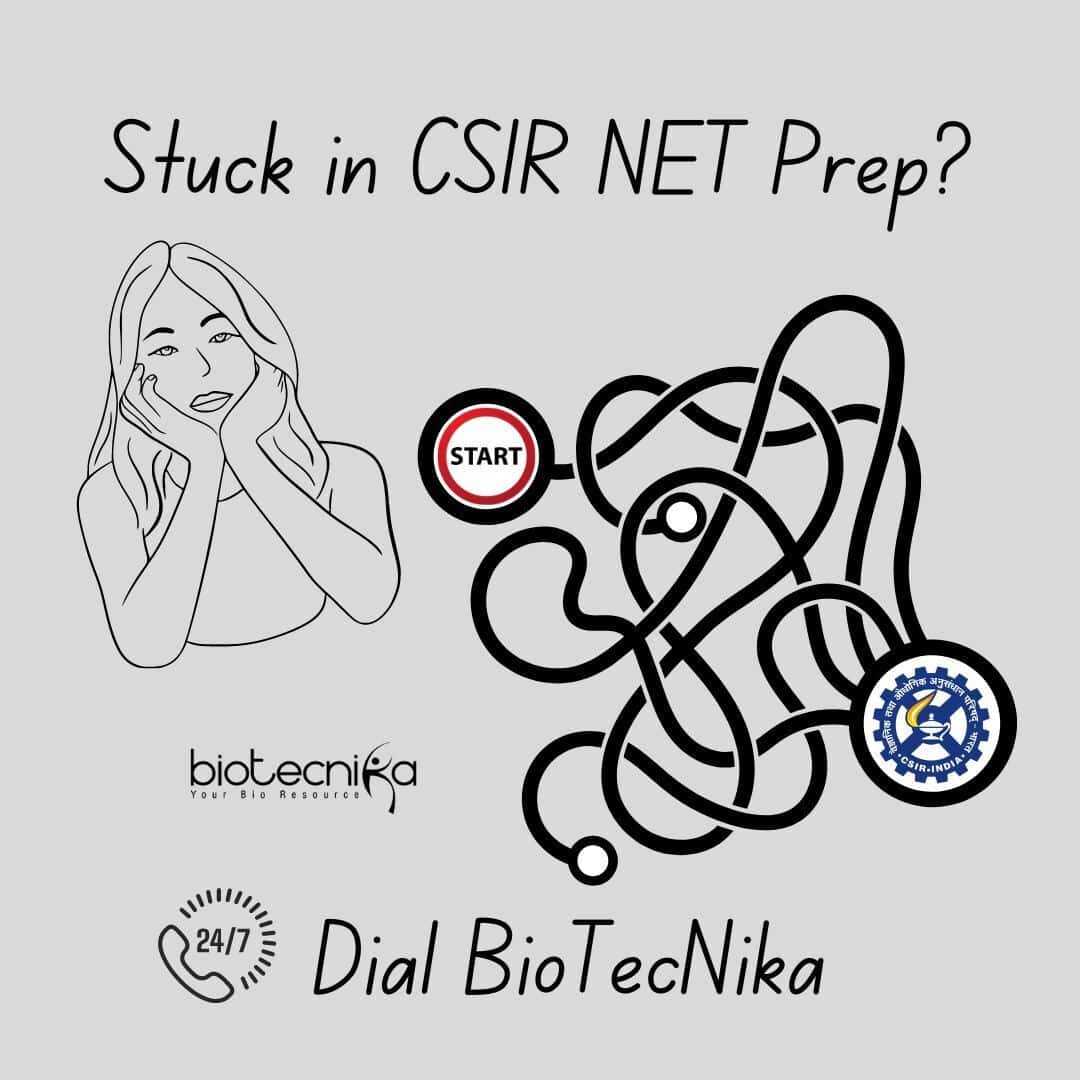CSIR NET Life Science Important Topics To Study
The CSIR NET Life Science Exam (Council of Scientific and Industrial Research National Eligibility Test) is a prestigious national-level exam for candidates who want to pursue research or lectureships in the field of life sciences. With the CSIR NET June 2024 Exam approaching, aspirants must focus on the most important CSIR NET Life Science Topics—to maximize their preparation efforts strategically.
Table of Contents
Weightage and Importance
We always tell our students that the CSIR NET Syllabus is so vast that an individual book can be written for each topic & unit included in the syllabus. Aspirants often get lost in-
- where to start studying?
- How do you prepare effectively for the CSIR NET Life Science exam?
- What topics to study?
- What topics can be left?
- Should I complete the whole syllabus? & many such questions
To streamline your preparation process, the most crucial step is understanding the important topics you must study at any cost to qualify for the
CSIR Net Life Science exam. The list of important topics below is categorized according to their units, depth of preparation required, and recommended units to study together.FREE DOWNLOAD LIST OF 100 IMPORTANT TOPICS TO STUDY FOR UPCOMING CSIR NET EXAM
CSIR NET Life Science Important Topics & Depth of Preparation Needed For Each
| Unit | Important Topics | Depth of Preparation | Topics that can be studied Together |
|---|---|---|---|
| 1 | Amino acids, Protein Structure, Nucleic acids, Enzymology | High | Thermodynamics, Glycolysis, Krebs Cycle, Bioenergetics & Oxidative Phosphorylation |
| 2 | Membrane structure, Cell cycle regulation | Medium | FRAP, Structure of chromatin and chromosomes, Growth curve of bacteria |
| 3 | DNA replication and repair, Gene regulation | High | RNA synthesis and processing, Protein synthesis and processing |
| 4 | Cell Signaling, Cancer biology, Immunology | High | Host immune responses to bacterial infection, Cell–cell and cell-matrix interactions, Apoptosis |
| 5 | Developmental Biology | High | Cleavage divisions, Drosophila development, Limb formation and regeneration |
| 6 | Photosynthesis, Plant hormones | Medium | Respiration and photorespiration, Nitrate and ammonium assimilation |
| 7 | System Physiology – Animal | High | ECG, Physiology of vision and hearing, Function of different parts of the nephron |
| 8 | Inheritance Biology | High | Mendelian principles and its extensions, Linkage mapping, Microbial gene mapping |
| 9 | Diversity of Life Forms | Medium | Classification of plants, animals & microorganisms, Organisms of conservation concern |
| 10 | Ecological Principles | High | Population Ecology, Species Interactions, Community Ecology |
| 11 | Evolution and Behavior | Medium | Phylogenetic tree analysis, HW Equilibrium, Parental investment and care |
| 12 | Applied Biology | High | Agrobacterium-mediated gene transformation, Breeding in plants and animals, Bioremediation, phytoremediation |
| 13 | Methods in Biology | High | Restriction Enzymes & Digestion, Molecular Markers, Blotting Techniques |
CSIR NET MOST Important Topics LIST: Do Not Miss Studying These
(For Those who have less time to prepare or who are attempting the exam for the 2nd or 3rd time and want to focus on revising important topics)
Unit 1: Molecules and their Interaction Relevant to Biology
- Amino acids
- Protein structure and conformation
- Nucleic acids and biosynthesis
- Enzymology – Properties, kinetics, and inhibition
- Thermodynamics
- Glycolysis, Krebs Cycle
- Bioenergetics & Oxidative Phosphorylation
Unit 2: Cellular Organization
- Membrane structure & solute transport
- FRAP
- Cell organelles & Protein transport
- Structure & function of the cytoskeleton and its role in motility
- Structure of chromatin and chromosomes
- Steps in cell cycle, regulation, and control of cell cycle
- Growth curve of bacteria
Unit 3: Fundamental Processes
- DNA replication and repair
- RNA synthesis and processing
- Protein synthesis and processing
- Operon model and regulation
- Gene regulation in phage

1800-1200-1818 or 080-5099-7000 or email [email protected]
Online Classes, Study Material, eBooks, Revision Notes, Test Series available
Limited Stocks
Unit 4: Cell Communication & Cell Signaling
- Host immune responses to bacterial infection and bacterial evasion mechanisms
- Signalling through G-protein coupled receptors, receptor enzymes, JAK-STAT, nuclear receptors
- Cell – cell and cell-matrix interactions, cell adhesion, and roles of different adhesion molecules, ECM proteins
- Apoptosis – Sequence of events, proteins involved, different types
- Cancer – oncogenes, tumour suppressor genes, cancer and the cell cycle.
- Immunology-Innate and adaptive immune system, MHC molecules-Antigen Processing and Presentation, Complement system, B and T cell maturation, activation, Cytokines, Vaccines
Unit 5: Developmental Biology
- Basic terms and terminologies of developmental biology
- Cleavage divisions, gastrulation and axis formation in sea urchin, amphibians, chicks, and mammals
- Drosophila development and organogenesis
- Limb formation and regeneration
- Vulva Development in C.elegans
- Neurulation
- Plant Development – ABC model of flower development
Unit 6: System Physiology – Plant
- Photosynthesis
- Respiration and photorespiration
- Nitrate and ammonium assimilation
- Plant hormones
- Structure, function, and mechanisms of action of phytochromes, cryptochromes, and phototropin; stomatal movement
- Mechanisms of loading and unloading of photoassimilates.
- Secondary metabolites
Unit 7: System Physiology – Animal
- Hemostasis mechanisms
- ECG, cardiac cycle & blood pressure regulation
- Factors affecting oxygen saturation curves
- Action potential generation
- Physiology of vision and hearing
- Function of different parts of the nephron
- Hormones and diseases
- Female reproductive cycle
Unit 8: Inheritance Biology
- Mendelian principles and its extensions
- Linkage mapping, physical mapping
- Microbial gene mapping
- Pedigree analysis
- Mutation and complementation test
- Transposons
- Tetrad analysis
Unit 9: Diversity of Life Forms
- Classical & quantitative methods of taxonomy
- Classification of plants, animals & microorganisms
- Organisms of conservation concern
Unit 10: Ecological Principles
- Habitat and Niche
- Population Ecology
- Species Interactions
- Community Ecology
- Ecological Succession
- Ecosystem Ecology
- Biogeography
- Ecological Rules
Unit 11: Evolution and Behavior
- Scientists and their theories of evolution
- Paleontological history of Earth
- Phylogenetic tree analysis
- HW Equilibrium, speciation
- Parental investment and care
- Altruism
- Migration
- Types of learning
Unit 12: Applied Biology
- Agrobacterium-mediated gene transformation
- Gene therapy
- Breeding in plants and animals, including marker–assisted selection
- Tissue culture in plants & animals
- Bioremediation, phytoremediation, biosensors
Unit 13: Methods in Biology
- Restriction Enzymes & Digestion
- Molecular Markers
- Blotting Techniques (Southern, Northern, Western)
- Flow cytometry & Fluorescence Activated Cell Sorting (FACS)
- Spectroscopic Techniques (UV/Visible, Fluorescence, Circular Dichroism, NMR Spectroscopy, Mass Spectrometry)
- Radioisotope types, Decay process, & Half-life
- Light & Electron Microscopic Techniques
- ECG & EEG
FREE DOWNLOAD LIST OF 100 IMPORTANT TOPICS TO STUDY FOR UPCOMING CSIR NET EXAM
CSIR NET Life Science Unit-wise Important Topics in Detail
(For those who have at least 6-8 months of preparation in hand, First-time aspirants)
Unit 1: Molecules and their Interaction Relevant to Biology
- Amino acids
- Protein Structure and conformation
- Nucleic acids and biosynthesis
- Enzymology – Properties, kinetics, and inhibition
- Thermodynamics
- Glycolysis, Krebs Cycle
- Bioenergetics & Oxidative Phosphorylation
Unit 2: Cellular Organization
- Membrane structure & solute transport
- FRAP
- Cell organelles & Protein transport
- Structure & function of cytoskeleton and its role in motility
- Structure of chromatin and chromosomes
- Steps in cell cycle, regulation, and control of cell cycle
- Growth curve of bacteria
Unit 3: Fundamental Processes
- DNA replication and repair
- RNA synthesis and processing
- Protein synthesis and processing
- Operon model and regulation
- Gene regulation in phage
Unit 4: Cell Communication & Cell Signaling
- Host immune responses to bacterial infection and bacterial evasion mechanisms
- Signalling through G-protein coupled receptors, receptor enzymes, JAK-STAT, nuclear receptors
- Cell – cell and cell-matrix interactions, cell adhesion, and roles of different adhesion molecules, ECM proteins
- Apoptosis – Sequence of events, proteins involved, different types
- Cancer – oncogenes, tumor suppressor genes, cancer and the cell cycle.
- Immunology-Innate and adaptive immune system, MHC molecules-Antigen Processing and Presentation, Complement system, B and T cell maturation, activation, Cytokines, Vaccines
Unit 5: Developmental Biology
- Basic terms and terminologies of developmental biology
- Cleavage divisions, gastrulation and axis formation in sea urchin, amphibians, chicks, and mammals
- Drosophila development and organogenesis
- Limb formation and regeneration
- Vulva Development in C.elegans
- Neurulation
- Plant Development – ABC model of flower development
Unit 6: System Physiology – Plant
- Photosynthesis
- Respiration and photorespiration
- Nitrate and ammonium assimilation
- Plant hormones
- Structure, function, and mechanisms of action of phytochromes, cryptochromes, and phototropin; stomatal movement
- Mechanisms of loading and unloading of photoassimilates.
- Secondary metabolites
Unit 7: System Physiology – Animal
- Hemostasis mechanisms
- ECG, cardiac cycle & blood pressure regulation
- Factors affecting oxygen saturation curves
- Action potential generation
- Physiology of vision and hearing
- Function of different parts of the nephron
- Hormones and diseases
- Female reproductive cycle
Unit 8: Inheritance Biology
- Mendelian principles and its extensions
- Linkage mapping, physical mapping
- Microbial gene mapping
- Pedigree analysis
- Mutation and complementation test
- Transposons
- Tetrad analysis
Unit 9: Diversity of Life Forms
- Classical & quantitative methods of taxonomy
- Classification of plants, animals & microorganisms
- Organisms of conservation concern
Unit 10: Ecological Principles
- Habitat and Niche
- Population Ecology
- Species Interactions
- Community Ecology
- Ecological Succession
- Ecosystem Ecology
- Biogeography
- Ecological Rules
Unit 11: Evolution and Behavior
- Scientists and their theories of evolution
- Paleontological history of Earth
- Phylogenetic tree analysis
- HW Equilibrium, speciation
- Parental investment and care
- Altruism
- Migration
- Types of learning
Unit 12: Applied Biology
- Agrobacterium-mediated gene transformation
- Gene therapy
- Breeding in plants and animals, including marker–assisted selection
- Tissue culture in plants & animals
- Bioremediation, phytoremediation, biosensors
Unit 13: Methods in Biology
- Restriction Enzymes & Digestion
- Molecular Markers
- Blotting Techniques (Southern, Northern, Western)
- Flow cytometry & Fluorescence Activated Cell Sorting (FACS)
- Spectroscopic Techniques (UV/Visible, Fluorescence, Circular Dichroism, NMR Spectroscopy, Mass Spectrometry)
- Radioisotope types, Decay process, & Half-life
- Light & Electron Microscopic Techniques
- ECG & EEG
FREE DOWNLOAD LIST OF 100 IMPORTANT TOPICS TO STUDY FOR UPCOMING CSIR NET EXAM
In conclusion, For the CSIR NET Life Science June 2024 exam, students should prioritize studying key topics such as cell biology, molecular mechanisms, gene names, and ecological principles. Additionally, focusing on gene transfer, plant breeding, gene therapy, bioremediation, vaccines, fermentation, biosensors, molecular interactions, statistical formulas, gene regulation, inhibitors, cell signalling, immunology, developmental biology, plant physiology, metabolism, biochemical pathways, photosynthesis, respiration, plant hormones, phytochromes, solute transport, nitrogen cycle, animal physiology, ECG, blood pressure regulation, neurotransmitters, genetics, sex-specific traits, diversity, classification, conservation, ecology, evolution, genetic drift, natural selection, and behavioural ecology is essential. These topics are crucial for the exam and can significantly impact scoring.
Effective preparation for the CSIR NET Life Science examination demands a thorough understanding of the core concepts across various units of biology. By focusing on the important topics outlined above and adopting a strategic study approach, aspirants can enhance their chances of success in the upcoming CSIR NET June 2024 Exam. Regular revision, practice, and staying updated with recent advancements in the field are also essential for achieving optimal results.
Best of luck with your preparations!
Biotecnika is always here to support & guide you in the CSIR NET Journey. In case you need any assistance, please feel free to reach out to us at 1800-1200-1818 or 080-5099-7000 or email [email protected]
Online Classes, Study Material, eBooks, Revision Notes, Test Series available.








































